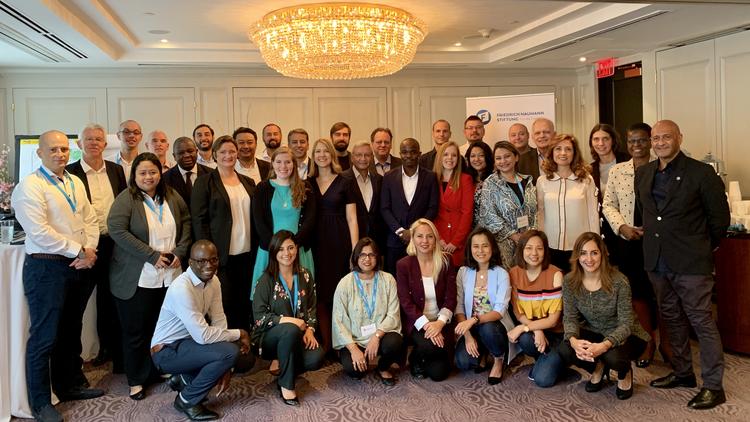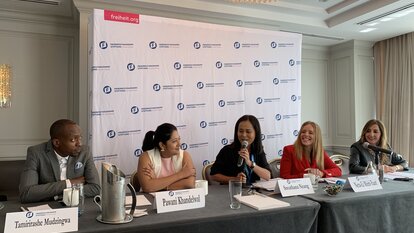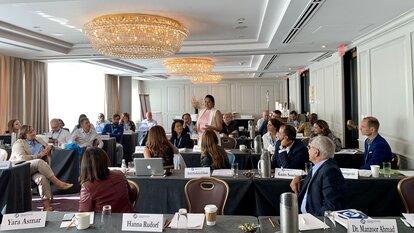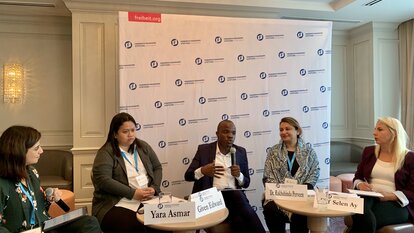#UnitedNationsOfInnovation
Defining a New Global Economy

In September, the Forum on the World Economic Order (WEO) Alumni Conference brought together 34 experts representing 23 countries in Washington, DC to discuss and debate issues pertinent to innovation and the new global economy. Over the course of four days, the participants took part in five panel discussions, completed a case study challenge on governance and had opportunities to network with experts from other Forum WEO programs representing a wide geographical and professional range. Three panels, in particular, explored innovation themes with regard to entrepreneurship, the future of work, and the global economy in a rapidly developing world.



Global Innovation and Entrepreneurship
As more and more startup hubs are increasingly “clustering” in major cities, causing a so-called “brain drain” in some regions, experts from Cambodia, Morocco, India, Israel, and Zimbabwe shared their thoughts on how the concept of entrepreneurship has changed with regard to the global economy. The panelists agreed that part of why so many startups are unsuccessful is because entrepreneurship has become a romanticized field, leaving newcomers uninformed as to the challenges and efforts necessary to be a successful entrepreneur. One proposed solution to this is to integrate “entrepreneurial education” into school curriculums, allowing students earlier exposure to the startup world, while better understanding the tools and resources needed to succeed. The establishment of a mentoring network that allows for best-practice sharing could also be useful to not only develop an entrepreneurial ecosystem, but to ensure that entrepreneurship becomes a more equitable tool to increase global prosperity for historically underserved areas of the population.
The Digital Economy and the Future of Work
The world of work is changing at an unprecedented rate, as digital technology fundamentally alters the tools employees use, where they work, how they collaborate, and how they are organized. As a result of this unprecedented disruption, the “future of work” is a hot topic that continues to garner widespread attention. Panelists from Tunisia, Czech Republic, Honduras,Germany/Switzerland, and South Africa took up this topic to discuss what new opportunities digitalization offers for workers and organisations alike. The fact that the digital economy requires less reliance on the physical location of both producers and consumers means that the nature of work will also continue to change, as evidenced by the growing gig economy and the prevalence of independent online retailers. In addition, the successful harnessing of the innovations offered by new technologies will provide companies and entire national economies the competitive advantage of the overall nation in the global economy
The Global Economy in a Rapidly Developing World
The hyper-connectedness of billions of people to each other in an unprecedented global network allows for an almost instantaneous spread of new ideas and innovations today. When one combines this connectedness with the rapidly changing demographics around the world, shifting values and attitudes, and exponential advances in technology, it becomes quite clear that the next decade is setting up to be one of historic transformation. In an effort to better understand what this transformation might mean for future for emerging economies, experts from Lebanon Turkey, Tanzania, Philippines, and Pakistan discussed some of the major forces shaping the future of the global economy. Many of the themes discussed centered on the efficacy of multilateralism in trade and the role of technology as a tool that can either benefit or harm individuals. Other areas of focus included how to drive innovation, and what it means to build a global economy that is equitable, inclusive, and accessible. Finally, the panelists finished with a discussion on how best to support developing economies by empowering them to solve issues in their own specific economic and cultural context, rather than imposing outside solutions.
By bringing together alumni to exchange ideas and look at the broader definitions of innovation and the world economic order, the Alumni Conference was able to build on the Forum WEO’s foundation of expertise across diverse themes. Of particular value was the chance for participants to highlight certain problems in their own countries and discuss creative solutions to these with the other participants.
Johanna Rudorf, Regional Communications Officer & Policy Analyst, FNF Transatlantic Dialogue, Washington, DC.
